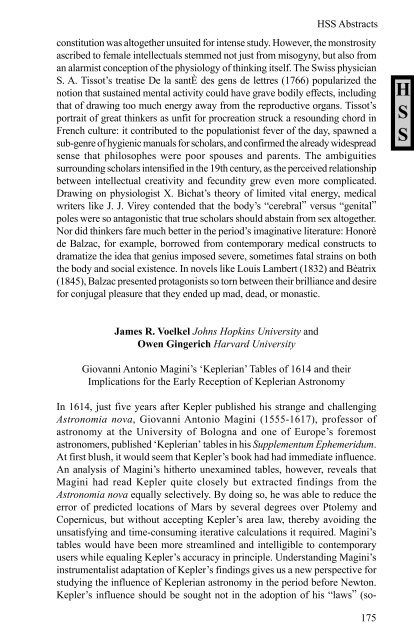2000 HSS/PSA Program 1 - History of Science Society
2000 HSS/PSA Program 1 - History of Science Society
2000 HSS/PSA Program 1 - History of Science Society
Create successful ePaper yourself
Turn your PDF publications into a flip-book with our unique Google optimized e-Paper software.
<strong>HSS</strong> Abstracts<br />
constitution was altogether unsuited for intense study. However, the monstrosity<br />
ascribed to female intellectuals stemmed not just from misogyny, but also from<br />
an alarmist conception <strong>of</strong> the physiology <strong>of</strong> thinking itself. The Swiss physician<br />
S. A. Tissot’s treatise De la santÈ des gens de lettres (1766) popularized the<br />
notion that sustained mental activity could have grave bodily effects, including<br />
that <strong>of</strong> drawing too much energy away from the reproductive organs. Tissot’s<br />
portrait <strong>of</strong> great thinkers as unfit for procreation struck a resounding chord in<br />
French culture: it contributed to the populationist fever <strong>of</strong> the day, spawned a<br />
sub-genre <strong>of</strong> hygienic manuals for scholars, and confirmed the already widespread<br />
sense that philosophes were poor spouses and parents. The ambiguities<br />
surrounding scholars intensified in the 19th century, as the perceived relationship<br />
between intellectual creativity and fecundity grew even more complicated.<br />
Drawing on physiologist X. Bichat’s theory <strong>of</strong> limited vital energy, medical<br />
writers like J. J. Virey contended that the body’s “cerebral” versus “genital”<br />
poles were so antagonistic that true scholars should abstain from sex altogether.<br />
Nor did thinkers fare much better in the period’s imaginative literature: Honorè<br />
de Balzac, for example, borrowed from contemporary medical constructs to<br />
dramatize the idea that genius imposed severe, sometimes fatal strains on both<br />
the body and social existence. In novels like Louis Lambert (1832) and Bèatrix<br />
(1845), Balzac presented protagonists so torn between their brilliance and desire<br />
for conjugal pleasure that they ended up mad, dead, or monastic.<br />
H<br />
S<br />
S<br />
James␣ R. Voelkel Johns Hopkins University and<br />
Owen Gingerich Harvard University<br />
Giovanni Antonio Magini’s ‘Keplerian’ Tables <strong>of</strong> 1614 and their<br />
Implications for the Early Reception <strong>of</strong> Keplerian Astronomy<br />
In 1614, just five years after Kepler published his strange and challenging<br />
Astronomia nova, Giovanni Antonio Magini (1555-1617), pr<strong>of</strong>essor <strong>of</strong><br />
astronomy at the University <strong>of</strong> Bologna and one <strong>of</strong> Europe’s foremost<br />
astronomers, published ‘Keplerian’ tables in his Supplementum Ephemeridum.<br />
At first blush, it would seem that Kepler’s book had had immediate influence.<br />
An analysis <strong>of</strong> Magini’s hitherto unexamined tables, however, reveals that<br />
Magini had read Kepler quite closely but extracted findings from the<br />
Astronomia nova equally selectively. By doing so, he was able to reduce the<br />
error <strong>of</strong> predicted locations <strong>of</strong> Mars by several degrees over Ptolemy and<br />
Copernicus, but without accepting Kepler’s area law, thereby avoiding the<br />
unsatisfying and time-consuming iterative calculations it required. Magini’s<br />
tables would have been more streamlined and intelligible to contemporary<br />
users while equaling Kepler’s accuracy in principle. Understanding Magini’s<br />
instrumentalist adaptation <strong>of</strong> Kepler’s findings gives us a new perspective for<br />
studying the influence <strong>of</strong> Keplerian astronomy in the period before Newton.<br />
Kepler’s influence should be sought not in the adoption <strong>of</strong> his “laws” (so-<br />
175
















